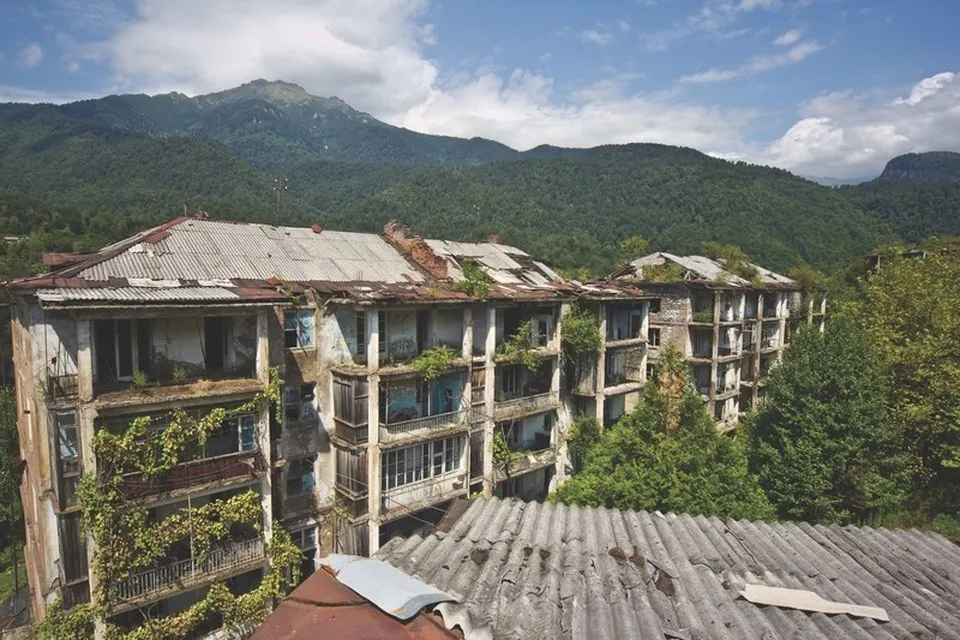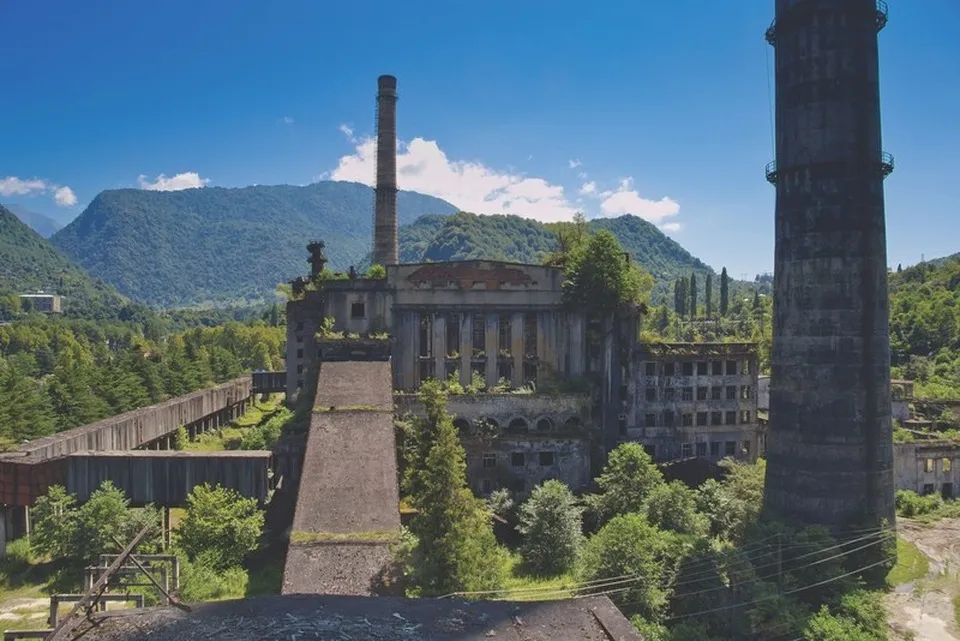Abandoned towns always possess a melancholic and mysterious beauty, igniting human curiosity to uncover the stories hidden behind the silence. Georgia, a nation at the crossroads of Europe and Asia, is not only renowned for its majestic natural landscapes and rich culture, but also preserves the quiet traces of time in forgotten towns. Here, amidst ancient ruins and wild nature, historical tales and human destinies gradually emerge, offering unique and emotionally resonant travel experiences.
Polyana, Abkhazia: Witness to Conflict
Abkhazia, a region in northwestern Georgia, was once a prosperous and culturally diverse area. The town of Polyana, formerly a vibrant destination with over 15,000 residents, experienced a tragic historical event that transformed it into a haunting “ghost town.” The root cause of Polyana’s decline was the Georgian-Abkhaz conflict in the late 1980s and early 1990s.
Before the war broke out, Polyana was a thriving community with a diverse economy, ranging from agriculture and tourism to light industry. The natural beauty of Abkhazia, with its enchanting Black Sea coast and majestic Caucasus Mountains, attracted visitors from across the Soviet Union. Polyana was also home to various ethnic groups, creating a colorful cultural tapestry.
However, this peace and prosperity were shattered by escalating ethnic tensions. The Georgian-Abkhaz conflict caused immense suffering and loss for both sides. Polyana, situated right in the conflict zone, became one of the most heavily affected areas. Most residents were forced to flee their homes to seek safety in other regions.
After the war ended, Polyana remained in ruins. The population plummeted to just around 200 people, mainly elderly individuals unwilling or unable to leave their homeland. Buildings that once served as homes, schools, and shops are now just dilapidated ruins, ravaged by time and nature. Stepping into Polyana, one can feel an eerie silence, as if time has stood still. The deserted streets, abandoned houses, and remnants of war all create a sorrowful picture of a town that has lost its soul.
Yet, amidst the devastation and desolation, Polyana retains a distinct beauty. Nature gradually reclaims the structures built by humans, creating a unique blend of architecture and landscape. Trees grow lushly on collapsed rooftops, vines entwine around mottled walls, all forming a scene that is both eerie and captivating. Polyana has become an appealing destination for travelers who enjoy exploring unique places and learning about history. It is not just a ghost town, but also a living witness to historical upheavals and lessons about peace and coexistence.

Tkvarcheli: Soviet Industrial Ghost
Tkvarcheli, another town in Abkhazia, carries a different tale of decline, linked to the collapse of the Soviet Union and profound economic and political shifts. If Polyana is a witness to ethnic conflict, then Tkvarcheli is a symbol of the disintegration of a system and its consequences on human lives.
Tkvarcheli was built and flourished during the Soviet era, becoming a significant industrial center for coal mining. The Tkvarcheli Power Plant, mentioned in the original article, played a pivotal role in providing energy to the region and was the town’s primary source of livelihood. The development of the coal industry attracted a large workforce and residents to Tkvarcheli, transforming it into a bustling industrial town with full amenities and services.
However, Tkvarcheli’s prosperity was entirely dependent on the centralized economic system of the Soviet Union. When the Soviet Union dissolved in 1991, economic ties were severed, and the supply and demand markets for coal shrank. The Tkvarcheli Power Plant, already outdated and deteriorating, gradually lost its importance. The difficult economic situation led to rising unemployment, and people’s lives became precarious.
The Georgian-Abkhaz conflict further exacerbated the situation in Tkvarcheli. The town was almost entirely besieged during the war, suffering significant casualties and property damage. After the war, the Tkvarcheli Power Plant nearly ceased operations, and the coal industry severely declined. Most residents, especially young people, left Tkvarcheli to seek opportunities elsewhere.
Today, Tkvarcheli presents a desolate and bleak appearance. Apartment blocks, public buildings, and the massive power plant are all abandoned and dilapidated. Nature gradually encroaches upon the reinforced concrete structures, creating an impressive contrast. Trees grow profusely on rooftops, vines creep over walls, and moss covers rusting machinery. Tkvarcheli has become a true “ghost town,” where time seems to stand still and the past vividly resurfaces.
Despite its desolate appearance, Tkvarcheli holds a special allure for those who love exploring industrial ruins and learning about Soviet-era history. The Tkvarcheli Power Plant, with its imposing architecture and surviving machinery, stands as a powerful testament to a bygone era. Abandoned apartment blocks, with remnants of daily life still visible, tell stories of the lives of workers and their families. Tkvarcheli is not just a ghost town, but a living museum of a significant historical period, a reminder of change and its repercussions.

Journey to Explore Georgia’s Ghost Towns
The abandoned towns in Georgia, especially Polyana and Tkvarcheli in Abkhazia, are not just unique tourist destinations but also living pages of history, marking historical upheavals and human stories. A journey to explore these ghost towns not only delivers powerful visual experiences but also evokes deep reflections on the past, present, and future.
Visitors to these ghost towns should prepare themselves for a silent and somewhat somber atmosphere. However, it is precisely this silence that allows visitors to deeply sense the history and culture of the place. Walking among the ruins, listening to the wind whistling through broken window frames, and imagining the life that once existed here are unforgettable experiences.
To enrich the trip, visitors should thoroughly research the history and context of each town. Information about the reasons for abandonment, historical events that transpired, and stories of local residents will help visitors deeply understand the cultural and historical value of these locations.
Additionally, visitors should also be mindful of security and respect for local culture when exploring abandoned towns in Abkhazia. Although the region has become relatively stable after the war, security and complex political issues still exist. Visitors should seek updated information on the security situation before traveling and adhere to the regulations and guidelines of local authorities.
Conclusion
The stories of abandoned towns in Georgia, particularly Polyana and Tkvarcheli, are vivid testimonies to the power of time and historical upheavals that can alter the destiny of an entire community. They are not merely unique tourist destinations but also valuable cultural and historical legacies that need to be preserved and cherished. Exploring these ghost towns is a journey back in time, an opportunity to contemplate the past and appreciate the values of the present. Simultaneously, it serves as a reminder of the importance of peace, coexistence, and sustainable development, so that the sad stories of abandoned towns will never be repeated.